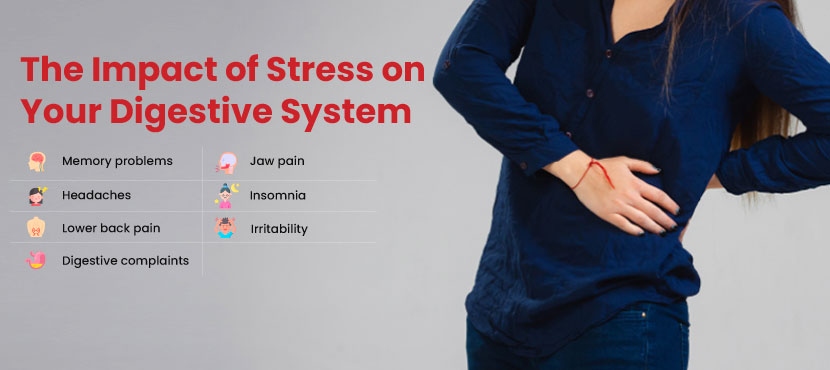The Impact of Stress on Your Digestive System
Most of us are familiar with stress and would have experienced it at some point of time in our lives for sure. Whether you are a student and are experiencing stress before your exams, or project submission, or before participating in your school play, taking part in any sports event etc. or you are a working professional experiencing stress after joining a new company or role, before the appraisals, while handling client escalation calls or delivering speech before your team, stress is a part of our lives.
While you might recognize some of the more common warning signs that stress is building to unhealthy levels: like difficulty breathing and rapid heartbeat, other stress signals may go unnoticed. Let’s explore this article to see how stress affects digestion.
Types of stress
- Short-term stress– This may be caused by situations like examinations, job interviews, weddings, childbirth, planning to buy a house or any other big item etc. The cause behind the stress stays for a short duration and hence the stress associated with it also ends after the event is over. These signs of stress often go unnoticed as they stay in the body for a short duration only.
- Long-term stress– This is one of the types of stress which most urban adults face today. Our lives have become so hectic and there is no security in jobs, relationships and any aspect of life that we are always stressed out. Suddenly a bomb blast kills thousands of people, sudden flood, earthquake, tsunami or war may completely change our lives. We live in a world where there is no guarantee of anything.
People go through long-term stress when they go through a constant problem like bad marriage, constant failure in conceiving a child, constant failure in the chosen career path etc.
- Chronic stress– When stress becomes a part of life, then it becomes chronic. If someone is detected with a terminal illness like blood cancer, ovarian cancer etc. wherein the patient knows that he/she will not live for a long time, he/she might get impacted with chronic stress related problems.
Children these are getting impacted with chronic stress when they are being bullied or sexually abused in childhood.
Seven lesser known signs of stress
- Memory problems– Stress hormone production demands a lot of mental effort. Your brain puts memories of routine events on the back burner in order to control the surge of stress hormones and concentrate on concerns. Thus, it may be challenging to concentrate if you experience persistent stress. It is possible that you will not be able to recall what you just read or that you will get distracted mid-sentence. You will miss out on regular chores like failing to switch off the coffee maker, calling friends to wish them on their birthdays etc.
- Headaches– Your brain can suffer a lot as a result of stress. In actuality, stress is a major contributor to both common tension headaches and more incapacitating migraine headaches.
- Lower back pain– One might feel tightness in their neck and shoulder muscles, which are commonly linked to stress, causing lower back pain. Lower back pain is not always linked to bad posture or sitting on desks or doing computer jobs, or desk jobs for long hours. Since we hold our emotions in our muscular tissues, stress has a very negative impact on our lumbar muscles.
- Digestive complaints– It might be difficult for anyone to handle stress and anxiety for a long time, especially if one does not have a healthy lifestyle. The body is producing more stomach acid than usual, which can cause a variety of digestive problems, from diarrhea and belly aches to heartburn.
- Jaw pain– Stress often causes jaw pains too along with neck and shoulder muscle pains. Some people tend to grind their teeth while sleeping to bring out that angst which might also cause jaw pains.
- Insomnia- If you are thinking all the time, your mind finds it difficult to shut down. Stressed out people often are sleep deprived and suffer from insomnia which impacts the digestive system badly. It is very important for the body to get eight hours of sleep after having dinner for it to digest the food properly and flush out the unwanted stuffs in the morning as excreta.
- Irritability- Stressed out people often lose their patience very fast and get angry or irritable.
How does stress affect digestion?
You may not be aware of how closely our brain and gut work together. For instance, the stomach may begin to create digestive juices with the mere notion of food, much as the thought of giving a large presentation may result in constipation or uncontrollable bowel movements.
”A history of stress and trauma may contribute to some gastrointestinal conditions such as irritable bowel syndrome (IBS),” says Dr. Tracey Torosian, Ph. D., a health psychologist who specializes in gastrointestinal health with Henry Ford Health.
The effect of chronic stress on the digestive system
If you have personally experienced stress effects on digestion, you will know the pain yourself.
“When we’re stressed, our brain activates the sympathetic nervous system. The sympathetic nervous system is our flight-or-fight response: it prepares the body to protect itself against imminent danger by conserving functions that aren’t immediately needed for survival. That includes digestion. The emptying of the stomach is delayed, which can lead to a stomachache, indigestion, heartburn and nausea,’’ Dr. Torosian further clarified while talking about the stress effects on digestion.
Tips for alleviating stress and calming your stomach
These are the few tips which doctors, therapists and specialists suggest in order to reduce the impact of stress which in turn will calm our stomachs-
- Start meditating to soothe your nerves which will induce deep sleep.
- Eat foods rich in fiber like leafy vegetables, oats, fruits etc. and cut down on meats, carbohydrate rich diets which include a lot of flour, like pizzas, biscuits etc.
- Exercise regularly and go for regular walks. This helps in the production of happy hormones which reduce stress and help the patient sleep better.
- Take regular breaks and vacation. If you are a workaholic, you need to work hard to separate your personal life from work, especially these days when most people are still working from home. Make time for relaxing activities like playing sports, taking your pet out for a job, playing with your kids etc.
- Listen to soothing music and try to drift off to sleep.
- Take relaxing massages and try aromatherapy. The essential oils will soothe your mind and body and will bring down your stress levels from your muscles and tissues.





No Comments